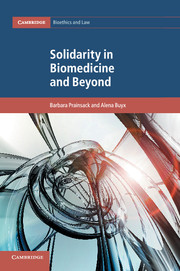Foreword
Published online by Cambridge University Press: 09 February 2017
Summary
For many of us – those of us of a certain age, at least – our first meaningful encounter with the term solidarity was in the early 1980s, with the rapid emergence of the Polish trade union, Solidarność. From our perspective in the United Kingdom, it seemed almost ironic that one of the most prominent resistance movements in Eastern Europe should take solidarity as its banner in opposing a government which, one would have thought, should have itself been rooted in solidaristic ideals. Instead, in many communist countries, references to solidarity were abused to support grave injustices.
Of course, solidarity has a much longer, broader and even more complex history than this, as Alena Buyx and Barbara Prainsack make clear. But the upshot of its use in the context of the Eastern European upheaval was that solidarity was a term that belonged mainly to political philosophy and principally to politics of the left at a time when UK politics – along with the politics of much of the West – was beginning its long drift to the right.
Speaking from a UK perspective, even though we had in the NHS and the welfare state institutions that were arguably among the most solidaristic anywhere in the world, we became rather confused as to whether appeals to solidarity had moved beyond the bounds of respectable public discourse. It was a term that could be used in localised, interpersonal contexts, but there was some unease with its use at a societal level, given some of the practices that some political regimes had used it to justify. We did, nevertheless, look to other parts of Europe and admire the way with which solidarité seemed to permeate at all levels and signify fights against oppression and inequality, and for social justice. Or maybe that was just me.
In the meantime, bioethics was a youth, finding its way in a world that was losing many of its old certainties. We were no longer so confident that we should simply do what our doctor said. We were no longer sure that science would deliver progress that was an unqualified good. And we were no longer sure (if ever, indeed, we had been) that our interests as individuals and as communities and societies were adequately protected by those in authority.
- Type
- Chapter
- Information
- Solidarity in Biomedicine and Beyond , pp. xi - xivPublisher: Cambridge University PressPrint publication year: 2017

